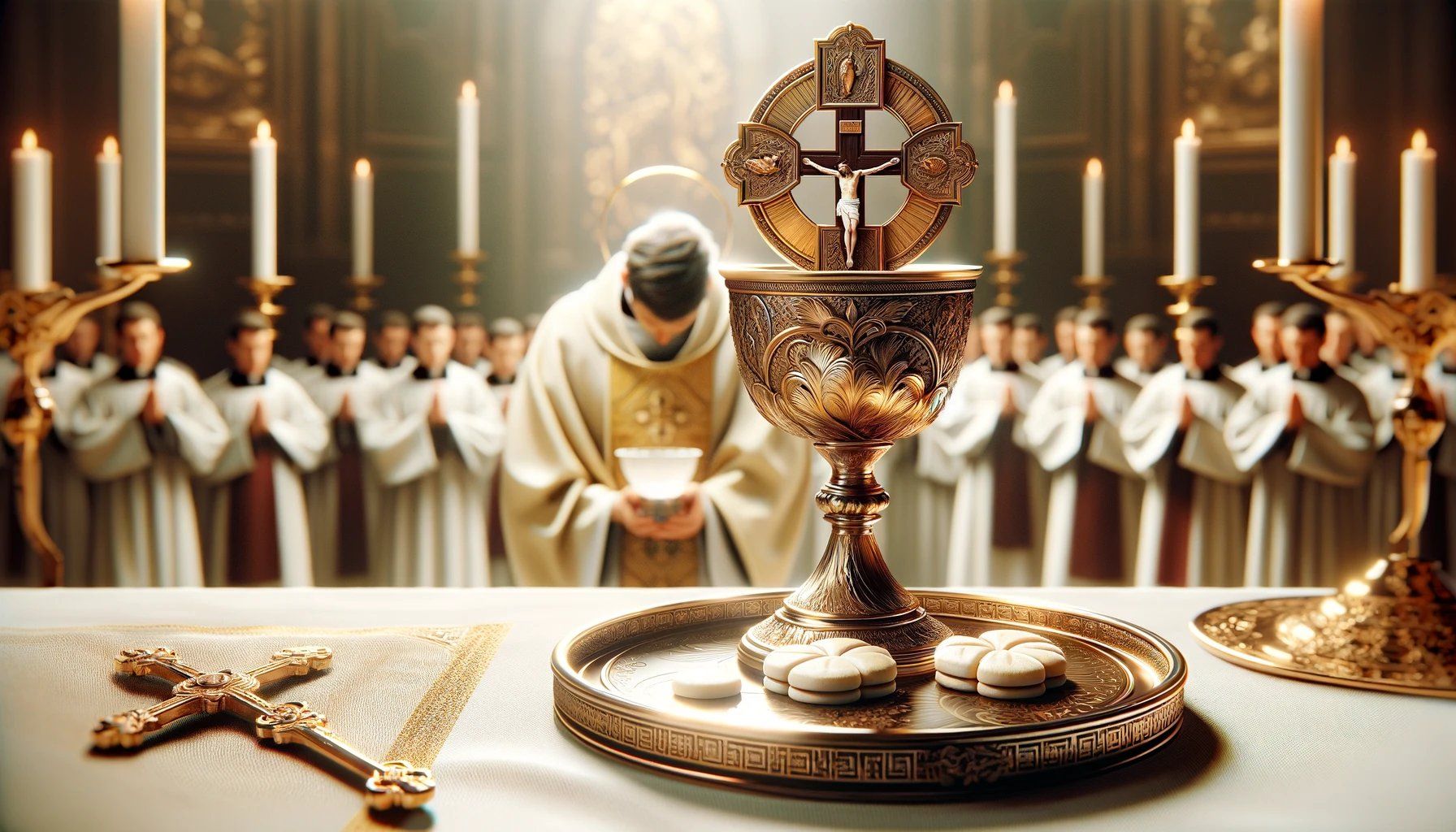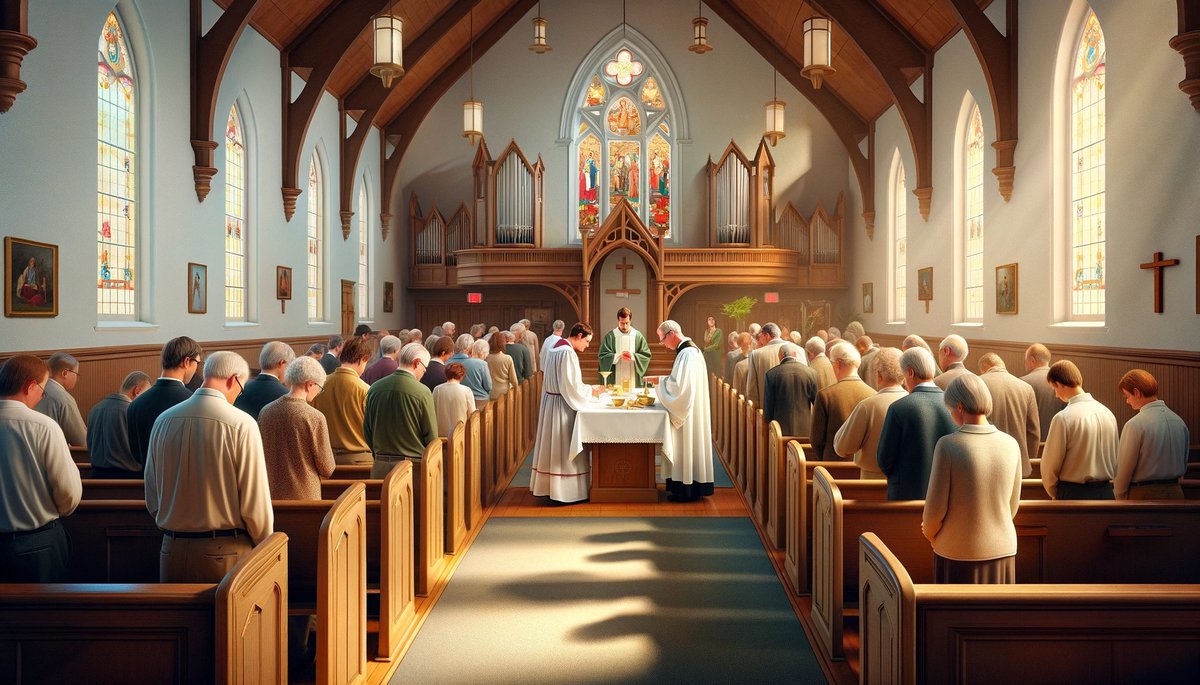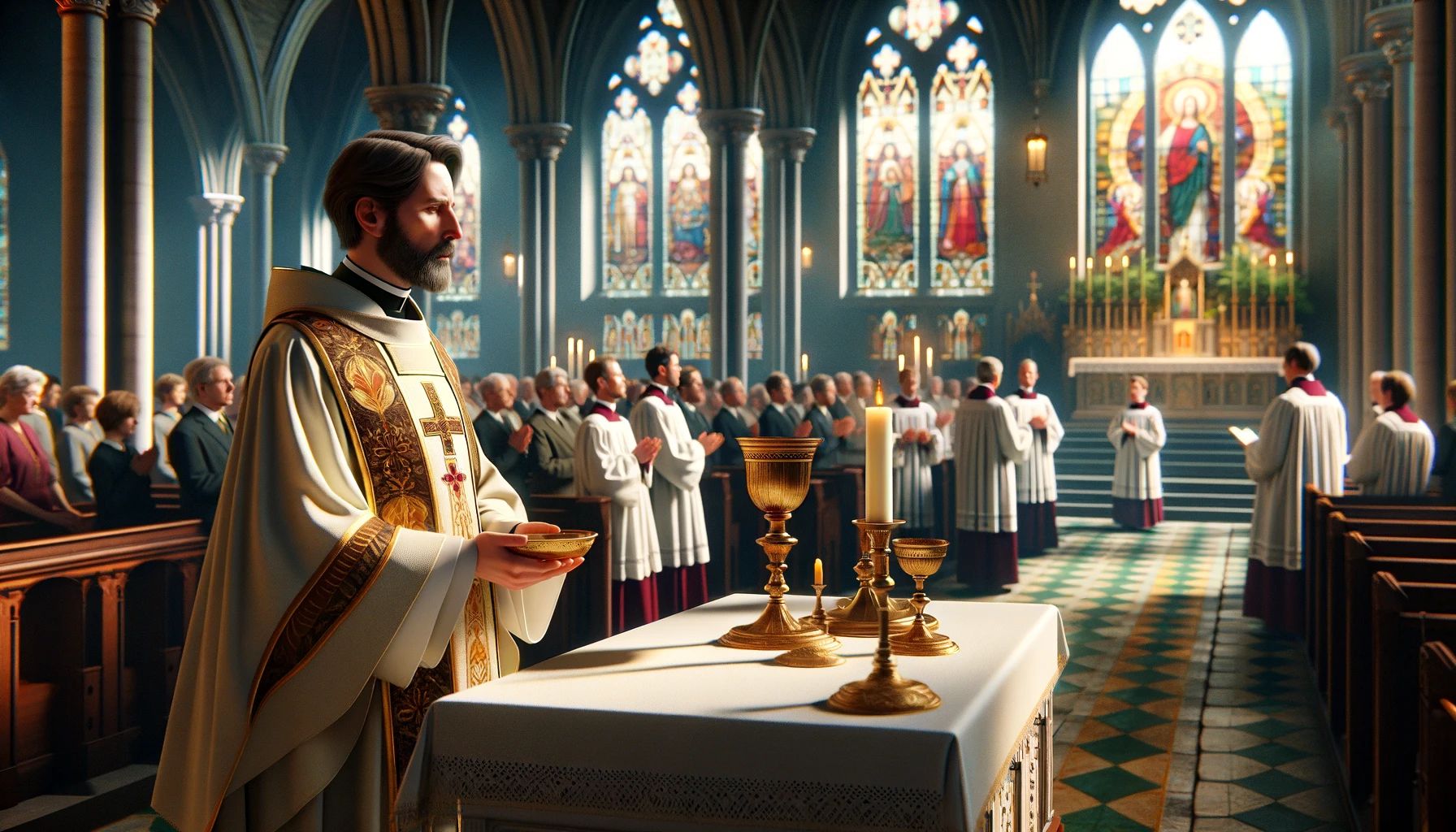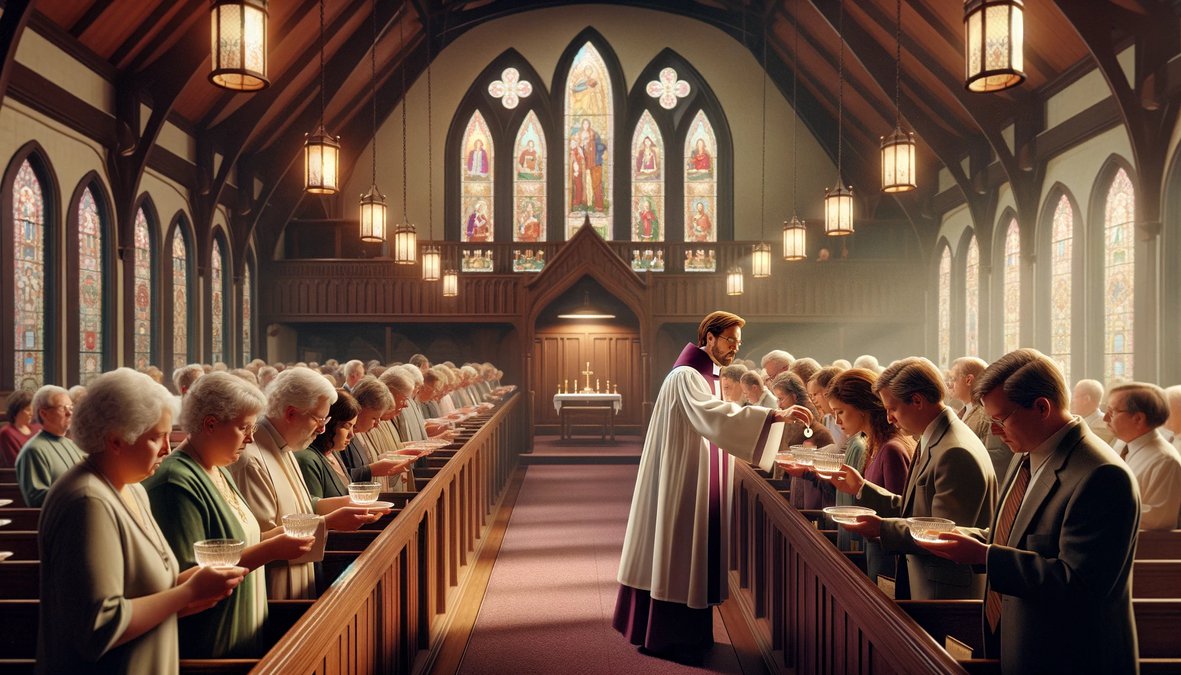Home>Theology and Spirituality>Who Can Take Communion In An Anglican Church


Theology and Spirituality
Who Can Take Communion In An Anglican Church
Published: February 24, 2024
Ericka Andersen, an editor at Christian.net, expertly merges digital strategy with content creation, focusing on faith and societal issues. Her communication skills enhance the platform's engaging narratives, fostering meaningful dialogue on belief's impact on society.
Discover the guidelines for receiving communion in an Anglican Church and the theological significance behind it. Learn about the theology and spirituality of communion in the Anglican tradition.
(Many of the links in this article redirect to a specific reviewed product. Your purchase of these products through affiliate links helps to generate commission for Christian.net, at no extra cost. Learn more)
Table of Contents
Introduction
Communion, also known as the Eucharist or the Lord's Supper, holds profound significance in the Anglican Church. It is a sacred ritual that symbolizes the spiritual nourishment and unity of believers with Christ and one another. The act of partaking in communion is deeply rooted in the teachings of Jesus Christ, as recorded in the New Testament, and has been a central aspect of Christian worship for centuries.
In the Anglican tradition, communion is not merely a symbolic ritual but is believed to be a sacrament, a means of grace through which believers experience the presence of Christ in a profound and transformative way. The Eucharist is a focal point of Anglican worship, and the manner in which it is celebrated reflects the rich tapestry of Anglican theology, spirituality, and liturgical practices.
Understanding the significance and the requirements for taking communion in the Anglican Church is essential for both members of the Anglican community and those seeking to participate in this sacred rite. It is a practice that embodies the core beliefs of Anglicanism and serves as a unifying force that transcends denominational boundaries.
As we delve into the nuances of communion in the Anglican Church, we will explore the theological underpinnings, the prerequisites for participation, and the inclusivity that characterizes this sacramental practice. By gaining a deeper understanding of communion in the Anglican context, we can appreciate its profound spiritual and communal significance and the reverence with which it is approached by Anglicans worldwide.
Read more: Who Can Take Communion In A Baptist Church
Understanding Communion in the Anglican Church
Communion, also known as the Eucharist, is a central element of worship in the Anglican Church. It is a sacrament that holds deep theological and spiritual significance for Anglicans worldwide. At the heart of Anglican belief is the understanding that during the Eucharist, the bread and wine become, in a mysterious and profound way, the body and blood of Christ. This belief, known as the doctrine of the Real Presence, underscores the spiritual reality of Christ's presence in the sacrament.
The Anglican approach to the Eucharist is characterized by a balance between reverence for tradition and openness to diverse theological perspectives. While some Anglicans interpret the Real Presence in a more literal sense, others view it as a spiritual presence or as a commemoration of Christ's sacrifice. This breadth of interpretation reflects the Anglican commitment to embracing a diversity of beliefs within a common worship framework.
In Anglican liturgical practice, the celebration of the Eucharist is often referred to as the Holy Communion or the Mass. The liturgy surrounding the Eucharist is rich in symbolism and ritual, drawing from ancient Christian traditions while also allowing for variations in worship styles across different Anglican communities. The Book of Common Prayer, a foundational text in Anglicanism, provides the liturgical framework for the celebration of the Eucharist, offering a blend of structured prayers, scripture readings, and congregational responses.
The Eucharist is not only a commemoration of Christ's last supper but also a communal act that signifies the unity of believers in Christ. It is a sacred moment of encounter with the divine, inviting participants to reflect on their relationship with God and with one another. The act of receiving the consecrated bread and wine is seen as a means of grace, nourishing the soul and strengthening the bond of faith within the worshipping community.
In summary, the Eucharist in the Anglican Church embodies a profound theological and spiritual reality, encompassing diverse interpretations while emphasizing the unity of believers in Christ. It is a sacrament that invites participants into a deeper experience of God's presence and love, reflecting the core values of Anglican worship and spirituality.
Requirements for Taking Communion
Participation in the Eucharist, or Holy Communion, within the Anglican Church is a sacred and deeply meaningful act that carries certain requirements. These requirements are rooted in the theological and liturgical traditions of Anglicanism and are intended to uphold the reverence and significance of the sacrament. While the specifics may vary slightly among different Anglican parishes and dioceses, there are general guidelines that govern who may partake in the Eucharist.
-
Baptism: The foundational requirement for taking communion in the Anglican Church is being baptized. Baptism is viewed as the sacramental entry into the Christian faith and is considered a prerequisite for participation in the Eucharist. Those who have not been baptized are encouraged to seek this sacrament before partaking in communion.
-
Confirmation: In addition to baptism, confirmation is often seen as a further affirmation of one's commitment to the Christian faith. While not universally required for receiving communion, confirmation is considered a significant milestone in one's spiritual journey and is often encouraged before partaking in the Eucharist.
-
Reception into the Anglican Church: For individuals who have been baptized and confirmed in other Christian traditions, reception into the Anglican Church may be necessary before taking communion. This process, known as reception or reconciliation, acknowledges the individual's desire to be in full communion with the Anglican Church and is typically overseen by a bishop.
-
Spiritual Preparation: Beyond the sacramental requirements, a disposition of reverence and spiritual readiness is emphasized for those approaching the Eucharist. This includes a spirit of repentance, a commitment to living a Christian life, and a genuine desire to receive the sacrament with faith and understanding.
-
Pastoral Guidance: In cases where individuals have questions or uncertainties about their eligibility to receive communion, seeking pastoral guidance from clergy members is encouraged. Clergy can provide spiritual counsel, address any concerns, and offer guidance on the appropriate preparation for receiving the Eucharist.
These requirements reflect the Anglican Church's commitment to upholding the sacred nature of the Eucharist while also extending a welcoming invitation to those who seek to participate in this central act of worship. By honoring the sacramental traditions and spiritual discernment, the Anglican approach to communion underscores the significance of this sacred rite within the life of the Church and the individual believer.
Who Can Take Communion
Participation in the Eucharist, or Holy Communion, within the Anglican Church is a sacred and deeply meaningful act that carries certain requirements. These requirements are rooted in the theological and liturgical traditions of Anglicanism and are intended to uphold the reverence and significance of the sacrament. While the specifics may vary slightly among different Anglican parishes and dioceses, there are general guidelines that govern who may partake in the Eucharist.
Baptism and Confirmation
The foundational requirement for taking communion in the Anglican Church is being baptized. Baptism is viewed as the sacramental entry into the Christian faith and is considered a prerequisite for participation in the Eucharist. Those who have not been baptized are encouraged to seek this sacrament before partaking in communion. In addition to baptism, confirmation is often seen as a further affirmation of one's commitment to the Christian faith. While not universally required for receiving communion, confirmation is considered a significant milestone in one's spiritual journey and is often encouraged before partaking in the Eucharist.
Read more: Who Can Take Communion In The Baptist Church
Reception into the Anglican Church
For individuals who have been baptized and confirmed in other Christian traditions, reception into the Anglican Church may be necessary before taking communion. This process, known as reception or reconciliation, acknowledges the individual's desire to be in full communion with the Anglican Church and is typically overseen by a bishop.
Spiritual Preparation
Beyond the sacramental requirements, a disposition of reverence and spiritual readiness is emphasized for those approaching the Eucharist. This includes a spirit of repentance, a commitment to living a Christian life, and a genuine desire to receive the sacrament with faith and understanding. The act of receiving communion is regarded as a deeply personal and spiritual experience, and individuals are encouraged to approach it with a heart open to the presence of Christ.
Pastoral Guidance
In cases where individuals have questions or uncertainties about their eligibility to receive communion, seeking pastoral guidance from clergy members is encouraged. Clergy can provide spiritual counsel, address any concerns, and offer guidance on the appropriate preparation for receiving the Eucharist. This pastoral support underscores the caring and inclusive nature of Anglican communities, where individuals are supported in their spiritual journey and discernment.
These requirements reflect the Anglican Church's commitment to upholding the sacred nature of the Eucharist while also extending a welcoming invitation to those who seek to participate in this central act of worship. By honoring the sacramental traditions and spiritual discernment, the Anglican approach to communion underscores the significance of this sacred rite within the life of the Church and the individual believer.
Special Circumstances
In the Anglican Church, there are special circumstances that may arise, leading to nuanced considerations regarding the participation in the Eucharist. These circumstances encompass a range of scenarios where individuals may find themselves navigating unique situations that impact their eligibility to receive communion. It is within these contexts that the pastoral sensitivity and inclusivity of Anglican communities come to the forefront, ensuring that individuals are supported in their spiritual journey and engagement with the sacramental life of the Church.
Pastoral Care and Discernment
Special circumstances may arise for individuals who, for various reasons, are unable to meet the traditional requirements for receiving communion. This could include individuals who are exploring the Christian faith, seeking spiritual guidance, or experiencing personal challenges that affect their participation in the sacraments. In such instances, pastoral care and discernment play a crucial role in providing support and guidance tailored to the unique needs of each individual.
Anglican clergy are committed to offering pastoral care that is compassionate, understanding, and discerning. They engage in meaningful conversations with individuals, attentively listening to their spiritual concerns and providing pastoral guidance that respects their circumstances. This may involve exploring the individual's spiritual journey, addressing questions or doubts, and offering a supportive presence as they navigate their relationship with God and the Church.
Inclusivity and Hospitality
The Anglican Church embraces a spirit of inclusivity and hospitality, welcoming individuals from diverse backgrounds and life situations. In special circumstances where individuals may not fully meet the traditional requirements for taking communion, Anglican communities strive to create an environment where all feel valued and included. This inclusive approach extends to individuals who may be exploring the Christian faith, seeking healing and reconciliation, or desiring to deepen their spiritual connection within the Anglican tradition.
By fostering a culture of inclusivity, Anglican communities seek to embody the love and grace of Christ, extending understanding and support to those navigating special circumstances. This inclusive ethos is grounded in the belief that all individuals are beloved children of God, deserving of compassion, respect, and a sense of belonging within the worshipping community.
Pastoral Flexibility and Support
In navigating special circumstances related to communion, Anglican clergy exercise pastoral flexibility, recognizing that each individual's spiritual journey is unique. This flexibility allows for pastoral discernment that takes into account the complexities of individual experiences, offering tailored support and pastoral care that respects the dignity and autonomy of each person.
Through pastoral support and flexibility, Anglican communities strive to create a space where individuals can authentically engage with their faith, seek spiritual nourishment, and find a sense of belonging within the worshipping community. This commitment to pastoral care and support reflects the Anglican Church's dedication to accompanying individuals through their spiritual joys and challenges, embodying the love and compassion of Christ in all circumstances.
In summary, special circumstances within the Anglican Church call for a pastoral approach that is rooted in compassion, inclusivity, and discernment. By embracing individuals in their unique spiritual journeys and offering pastoral support that respects their circumstances, Anglican communities seek to uphold the sacred nature of the Eucharist while extending a welcoming invitation to all who seek spiritual nourishment and communion with God and the worshipping community.
Conclusion
In conclusion, the act of taking communion in the Anglican Church is imbued with profound theological significance, spiritual depth, and communal unity. The Eucharist stands as a central sacrament that symbolizes the presence of Christ and the unity of believers in the Anglican tradition. The requirements for participation in the Eucharist, including baptism, confirmation, and spiritual readiness, reflect the reverence with which Anglicans approach this sacred rite. These requirements serve as a means of upholding the sanctity of the Eucharist while also inviting individuals into a deeper experience of faith and communion with God and the worshipping community.
The Anglican approach to communion is characterized by a balance of tradition and inclusivity, allowing for diverse theological perspectives while maintaining a shared liturgical framework. This balance reflects the Anglican commitment to embracing a breadth of beliefs within a unified worship context, fostering a sense of unity amidst theological diversity. The Eucharist serves as a focal point of Anglican worship, inviting participants into a sacred encounter with the divine and a communal expression of faith and love.
Special circumstances surrounding communion call for pastoral sensitivity, inclusivity, and discernment within Anglican communities. The pastoral care offered to individuals navigating unique situations underscores the compassionate and supportive ethos of the Anglican Church, ensuring that all individuals feel valued and included in their spiritual journey. This commitment to pastoral flexibility and support reflects the Anglican Church's dedication to accompanying individuals through their spiritual joys and challenges, embodying the love and compassion of Christ in all circumstances.
Ultimately, communion in the Anglican Church represents a sacred invitation to partake in the spiritual nourishment and unity offered through the Eucharist. It is a sacrament that transcends denominational boundaries, inviting all who seek a deeper connection with God and a sense of belonging within the worshipping community. By understanding the theological underpinnings, the requirements for participation, and the pastoral sensitivity surrounding communion, individuals can engage with this sacred rite in a manner that enriches their faith and fosters a deeper communion with the divine and fellow believers.













